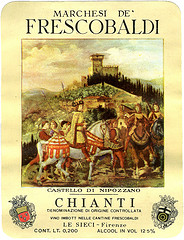 Most everyone knows the name Frescobaldi. After 30 generations of producing wine in Italy, they continue to dominate with distribution of their wines in 65 countries. They own five different estate vineyard sites throughout the Tuscany region planted to nearly 3,000 acres of grapes. Founded in the 14th century and a supplier of wines to the royal courts of Europe for generations, Marchesi de' Frescobaldi is still a family-owned company today. The company continually upgrades and modernizes its grape growing and winemaking operations, maintaining a relentless focus on producing unique wines that range from approachable, everyday wines to rare, collector vintages. Leonardo Frescobaldi has been President of Marchesi de’ Frescobaldi since 2007, acting as leader and managing partner of multiple Frescobaldi companies. Prior to this position, he was Director of International Sales and Marketing, Board Member, and President of the Luce della Vite estate.
Most everyone knows the name Frescobaldi. After 30 generations of producing wine in Italy, they continue to dominate with distribution of their wines in 65 countries. They own five different estate vineyard sites throughout the Tuscany region planted to nearly 3,000 acres of grapes. Founded in the 14th century and a supplier of wines to the royal courts of Europe for generations, Marchesi de' Frescobaldi is still a family-owned company today. The company continually upgrades and modernizes its grape growing and winemaking operations, maintaining a relentless focus on producing unique wines that range from approachable, everyday wines to rare, collector vintages. Leonardo Frescobaldi has been President of Marchesi de’ Frescobaldi since 2007, acting as leader and managing partner of multiple Frescobaldi companies. Prior to this position, he was Director of International Sales and Marketing, Board Member, and President of the Luce della Vite estate.
With 700 years of wine experience, are there still things you learn, things that take you by surprise with each vintage?
I consider that life represents the occasion for a continuous learning process. Particularly when you love the work you are doing. Certainly every vintage is a new chapter and brings a different challenge which enriches my patrimony of knowledge and experience.
Since your brand is positioned worldwide, what do you see as the greatest obstacle to the global wine consumer?
I don’t consider it an obstacle the fact that our brand is marketed worldwide, but it does requires a deep understanding of each specific market. That fundamental knowledge is essential in order to secure our brand with the correct positioning and distribution.
There has long been debate over the 100 point rating scale, made popular by Robert Parker and widely emulated. Some say it empowers consumers, others claim it distorts wine prices, while still others say it has gone much further and actually changed the quality of the wine being produced. What do you see as being the long term impact of the 100 point rating system?
It is simple and very effective. The consumer understands it because it is uncomplicated. Still, some of the educated and expert wine lovers are deciding according to their palate and taste, and do not refer to the 100 point system. I, however, consider it important and very educational, especially for the growth of new and young wine.
Rising wine alcohol levels in U.S. and more foreign wines are a hot topic these days in wine circles. What are your thoughts on the subject?
The continuous search for getting the highest score has, in the past, created wines very muscular, rich and of extraordinary dimensions. I feel that in the future this trend will change in favor of wines that are more elegant, harmonious, stylish, and balanced. Definitely wines will be more drinkable and more characterized by the respective terroir of their origin.
Does climate change have any effect or consideration on your company?
Not for us, so far.
Clearly family is an integral part of the Frescobaldi legacy and 30 generations of history is a huge selling point in the Frescobaldi story. Were there times in the past when family disagreements posed a financial risk to the brand?
The presence of normal internal different opinions by Frescobaldi members are a positive and constructive contribution. In the end, someone always makes the final decision and the others respect it. All of this happens because everybody considers internal harmony a strength and more important than individual interest and opinion. The fact that Frescobaldi has such a long history testifies to how important it is to cultivate and keep internal harmony between family members. I hope that this will be remembered and maintained in the years to come by future generations.
You have multiple vineyard sites across Tuscany and are the largest vineyard owner in the region. How do your vineyards differ from each other?
Frescobaldi consists of a collection of different estates in Tuscany, located in some of the best wine areas. Each estate is conducted as an independent and separate entity. Each one relies on the service of an agronomist, a wine maker, and a winery where the wines are produced and matured. Each of these estates are separate and each of them has developed a competitive approach against other Frescobaldi estates. That sense of competitiveness is very healthy and results in making sure that each estate produces wines of excellence enhancing the character and the typicity of the respective area.
With wine available everywhere, there is no longer the status symbol of an “imported” wine. Therefore how do you grow a global customer base where there is access to so many diverse wines?
I agree that the term “imported wine” has less importance and impact than many years ago. Our communication is more and more addressed to build up the reputation and the prestige of Frescobaldi as a trusted producer who brings the taste of Tuscany across the world.
More and more, wine is evolving into a cocktail, a stand alone drink in the U.S., rather than a beverage to be had with dinner. What are your thoughts on this?
The fact that wines are enjoyed in many different ways is a great privilege, with respect to other drinks which are only consumed on limited occasions. For Frescobaldi wines, we feel the ideal moment of opening a bottle is during a meal.
Being such a large wine producer, is it difficult to maintain strict quality control over all the wines being made?
I would not define Frescobaldi as a large wine producer, but a private family that owns different estates of medium and small dimensions where with passion and integrity for each of them, we are showcasing the excellence of the different estates. That is the daily goal we reach for.







